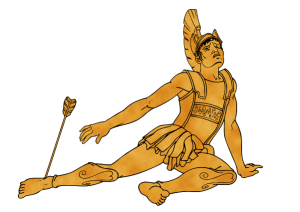Lars Barfoed skriver i Berlingske: ‘Danskerne skal kende historien.’ Barfoeds gennemgående tese er, at danskerne lider et identitetstab, fordi de efter Lars Barfoeds mening ikke kender nok til historien.
Barfoed skriver:
“Havde det eksempelvis ikke været for general Montgomerys snarrådighed – nogle ville måske sige ego – havde den røde hærs panserenheder nået Jylland først, og Danmark ville være fanget bag jerntæppets mørke.”
 Men det er forkert. Den Røde Hær ræsede ikke mod Jylland. Med undtagelse af Bornholm var Danmark ikke en del af USSR’s interessesfære, og det var aldrig meningen, at Danmark skulle besættes af USSR.
Men det er forkert. Den Røde Hær ræsede ikke mod Jylland. Med undtagelse af Bornholm var Danmark ikke en del af USSR’s interessesfære, og det var aldrig meningen, at Danmark skulle besættes af USSR.
Der var på Yalta-konferencen blevet aftalt nogle linjer for besættelsen af Tyskland, som de allierede allerede havde overskredet. De trak senere deres tropper tilbage til den aftalte linje, og USSR tillod USA, UK og Frankrig at komme ind i Berlin. Sovjet overholdt sine aftaler. Det havde intet med Montgomery at gøre.
Har Barfoed selv skrevet sin kronik?
Når man anlægger budskabet “danskerne skal kende historien” og en moraliserende og belærende tone, som Barfoed gør, står man sig bedst ved selv at besidde en stor historisk indsigt. Men spørgsmålet er, om Barfoed vitterligt selv besidder den indsigt, som han giver indtryk af i sin kronik.
Kronikkens indhold og udtryksform er dog påfaldende. Barfoed plejer ikke at være flittig til at anvende historiske referencer i sine taler eller kronikker, som han her gør. I det hele taget er det intellektuelle ikke det, man mest forbinder med Barfoed. Kronikkens sprogbrug, tone og indhold gør det utroværdigt, at Barfoed selv skulle have skrevet den.
Barfoed smed røret på, da han blev spurgt til egen kunnen
Efter at have problematiseret danskernes manglende historiekundskaber på Radio 24syv, blev Barfoed spurgt, hvornår Stavnsbåndet blev ophævet. Ved dette spørgsmål smed Barfoed omgående røret på.
Dette kan lede tankerne hen på en tidligere episode i Danmarks Radios ‘Deadline,’ hvor Barfoed fik vist et billede af konservatismens fader Edmund Burke, men ikke kunne genkende ham.
Så for at sammenfatte:
Lars Barfoed i gårsdagens Berlingske: “Historisk indsigt er … en naturlig grundpille i Det Konservative Folkeparti. Historisk indsigt er en uomgængelig forudsætning for at træffe rationelle beslutninger og samtidig det vigtigste værn mod blåøjet idealisme.”
Lars Barfoed i gårsdagens Radio24syv, da han bliver spurgt, hvornår Stavnsbåndet blev ophævet: Smider røret på.
Lars Barfoed i DR’s Deadline, da han bliver vist et billede af Edmund Burke: Genkender ikke personagen.
